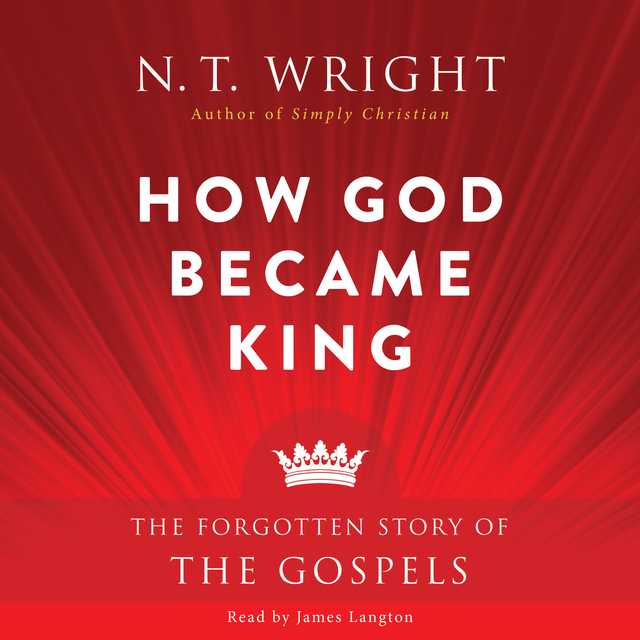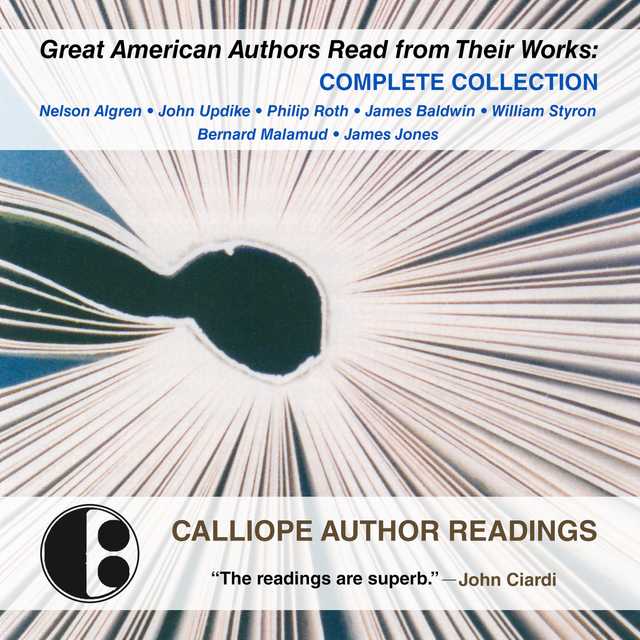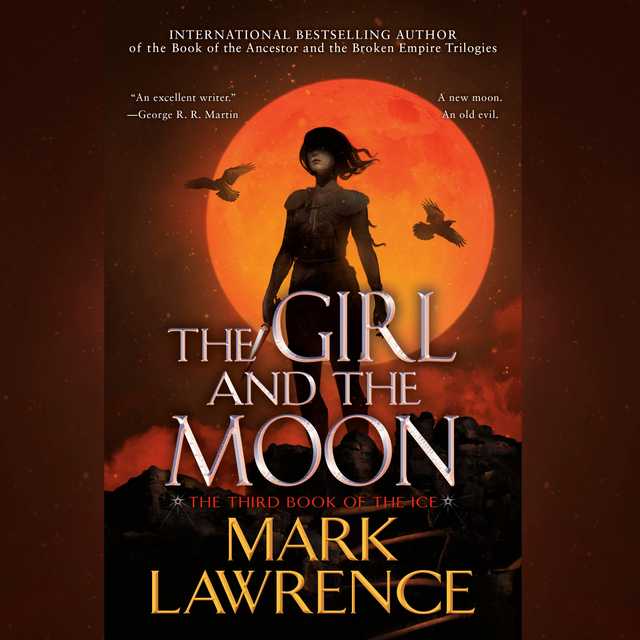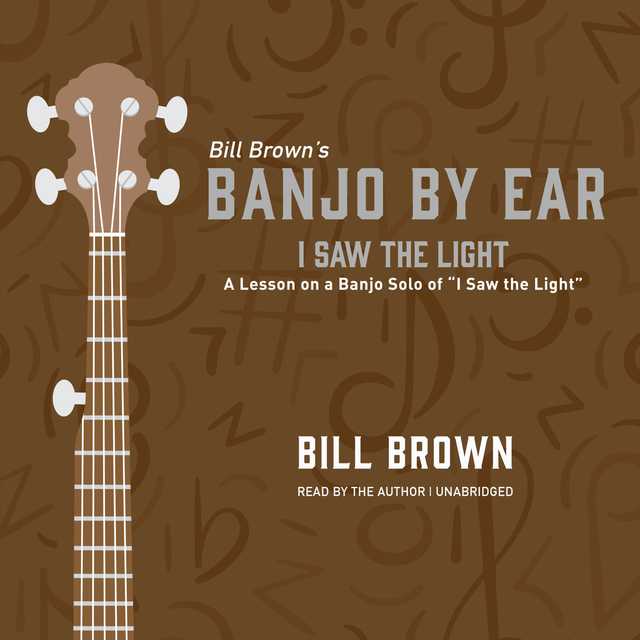How God Became King Audiobook Summary
New Testament scholar N.T. Wright reveals how we have been misreading the Gospels for centuries, powerfully restoring the lost central story of the Scripture: that the coronation of God through the acts of Jesus was the climax of human history. Wright fills the gaps that centuries of misdirection have opened up in our collective spiritual story, tracing a narrative from Eden, to Jesus, to today. Wright’s powerful re-reading of the Gospels helps us re-align the focus of our spiritual beliefs, which have for too long been focused on the afterlife. Instead, the forgotten story of the Gospels reveals why we should understand that our real charge is to sustain and cooperating with God’s kingdom here and now. Echoing the triumphs of Simply Christian and The Meaning of Jesus, Wright’s How God Became King is required reading for any Christian searching to understand their mission in the world today.
Other Top Audiobooks
How God Became King Audiobook Narrator
James Langton is the narrator of How God Became King audiobook that was written by N. T. Wright
N. T. Wright is the former Bishop of Durham in the Church of England and one of the world’s leading Bible scholars. He serves as the chair of New Testament and Early Christianity at the School of Divinity at the University of St. Andrews as well as Senior Research Fellow at Wycliffe Hall, Oxford University. He has been featured on ABC News, Dateline, The Colbert Report, and Fresh Air. Wright is the award-winning author of many books, including Paul: A Biography, Simply Christian, Surprised by Hope, The Day the Revolution Began, Simply Jesus, After You Believe, and Scripture and the Authority of God.
About the Author(s) of How God Became King
N. T. Wright is the author of How God Became King
More From the Same
How God Became King Full Details
| Narrator | James Langton |
| Length | 9 hours 30 minutes |
| Author | N. T. Wright |
| Category | |
| Publisher | HarperAudio |
| Release date | March 01, 2016 |
| ISBN | 9780062445223 |
Subjects
The publisher of the How God Became King is HarperAudio. includes the following subjects: The BISAC Subject Code is Biblical Studies, Jesus, the Gospels & Acts, Religion
Additional info
The publisher of the How God Became King is HarperAudio. The imprint is HarperAudio. It is supplied by HarperAudio. The ISBN-13 is 9780062445223.
Global Availability
This book is only available in the United States.
Goodreads Reviews
B.J.
December 04, 2019
This is my second reading through this book, but there was enough time between the two that many parts seemed almost fresh and new to me. Once again, I am giving this book a solid five-star rating.Right at the beginning, NT Wright shares how when he was a young student his Bible club wanted to do an exploration of who Jesus was. Different students were to prepare and share different aspects and Wright felt he drew the short straw. It is easy to talk about the birth of Christ. It is easy to talk about his death and resurrection. But his question, "Why did Jesus live here on earth?" seemed quite a bit more difficult. When you look at the Nicene Creed, it jumps right over the life of Christ going from birth to death. NT Wright then uses the picture of surround sound speakers to show that the gospels show four stories that need to be heard in balance in order to understand the music of the gospels. 1st Speaker: "It is important to retell the history of Israel and to show that the story of Jesus is the..." culmination of Israel's history, hopes, and purpose.2nd Speaker: "The story the gospels are telling, once we turn down the overly loud volume of the second speaker, which has simply been shouting, "He's divine! He's divine!" is the story of how YHWH has come back to His people at last."3rd Speaker - It isn't just that Jesus was establishing the church. "Rather, the gospels are consciously telling the story of how God's one-time action in Jesus the Messiah ushered in a new world order within which a new way of life was not only possible, but it was mandatory for Jesus' followers."4th Speaker - "The powers of this world exalt themselves against the Creator God... and God will not be mocked forever. The kingdoms of this world are to become the Kingdom of our God, and He will reign forever and ever."
James (JD)
November 24, 2012
The biggest shift in my theological experience can be traced to an understanding of "the Kingdom of God." I think that this phrase defines Christian denominations--from those who believe it is Heaven, waiting to come to Earth following an apocalypse, to those who believe it is exclusive to the Roman church, a sect exclusively following one Biblical rule or another, to those who see the Kingdom of God as everybody.I was eager to read N.T. Wright's take on the Kingdom of God. He presents a highly theosophical argument here (quite a few times, I felt that I was out of my league), using the gospels as the guide to what kind of community Jesus had in mind. Wright feels that Christians, who skip from "was born of the Virgin Mary" to "suffered under Pontius Pilate, died..." in the Apostle's Creed, miss out on what Jesus was really about. And he uses the various voices of the gospel writers to show Jesus story as one that confronted Roman misrule, one that fulfilled the prophecies of the Jewish writers, and one who was sent by God to set up a kingdom "not of this world."This is a solid book. A challenging one. One that I hope to read a 2nd time, just to get everything it offers. Ultimately, I feel that Jesus' kingdom, as described by Wright here, is to be "on earth as it is in heaven," and compels Christians to serve its eternal purposes.
David
March 24, 2012
N.T. Wright Switches Questions with an `Explosive' ResultMillions of Americans know former Bishop N.T. "Tom" Wright as the man who defends the Bible against skeptics. It certainly doesn't hurt that Wright does this in a wonderfully resonant British accent with the confident air of a latter-day C.S. Lewis, who in his day was a famous media personality himself. But, through several recent books, Wright has been trying to change the focus of his message to something he considers much more urgent for our tumultuous times.Wright certainly is famous as the Bible scholar who answers a hearty "Yes" to the question: Are the Gospels true? The question he is eager to answer is: What do the Gospels mean? In answering that second question, Wright deliberately uses the word "explosive" to convey the kind of passion and power he believes can be unlocked through the Christianity we discover in the Bible to this day. (He uses the e-word in a video he produced for the book, and he uses the e-word in the concluding passages of the book itself.)Wright has been leading readers down this pathway for years, now, in a series of books that tell general readers about Jesus' life and ministry (especially in his book Simply Jesus: A New Vision of Who He Was, What He Did, and Why He Matters) and about the entire New Testament as seen through the lens of Wright's Kingdom theology (either in his earlier small-group Bible-study booklets or in his 2011 The Kingdom New Testament: A Contemporary Translation). These ideas also can be found in the 2010 book After You Believe: Why Christian Character Matters. In the UK, Wright is well known for his public statements in venues like newspaper commentaries and Anglican gatherings. Here in the U.S., his American fans may still be making their way through his first dozen or so books. Churchgoers on this side of the Atlantic may not have caught up to Wright's current focus in teaching, especially since he stepped down as bishop of Durham in 2010 so that he has more time to teach and write about issues that urgently concern him.I recommend watching the YouTube video in which Wright himself gives a pretty good summary of this book's purpose. We include that video in ReadTheSpirit coverage of the new book. You might compare what he says in the video interview with a similar way he words it in the pages of the book itself. There, he writes: This book is about ... "the new reality of Jesus and his launching of God's kingdom. The new reality of a story so explosive ... that the church in many generations has found it too much to take and so has watered it down, cut it up into little pieces, turned it into small-scale lessons rather than allowing its full impact to be felt. Part of the tragedy of the modern church, I have been arguing, is that the `orthodox' have preferred creed to kingdom, and the `unorthodox' have tried to get a kingdom without a creed. It's time to put back together what should never have been separated. In Jesus, the living God has become king of the whole world."Provocative stuff! And Wright fearlessly raises a whole range of issues that will spark discussion in your small group. In the middle of the book, for example, he takes a shot at both Fox News as well as more liberal cultural icons. In the closing pages of the book, he outlines various ways that people "read" the church's great creeds today that wind up mistaking the central meaning of the Gospels. No question: A discussion of this new Wright book will draw a lively crowd in most congregations.Simply Jesus: A New Vision of Who He Was, What He Did, and Why He MattersKingdom New Testament-OEAfter You Believe: Why Christian Character Matters
Carl
April 04, 2018
I love N.T. Wright's material. He has such a refreshing way of explaining theological concepts I've habitually taken for granted (or ignored altogether).In this book, he manages to challenge everything I've always believed about the Gospels while at the same time illuminating some of the most confusing aspects of them. His basic premise is just what the title claims: the Gospels, more so than simple biographies of Jesus, or Passion narratives with extended introductions, are accounts explaining how Israel's God (in the person of Jesus), has become king of the world.This perspective makes so much more sense to me of all the material in the middle of the Gospel; all the accounts of water to wine, healing, walking on water, and teaching are far more intelligible as stories of Jesus establishing God's rule over all creation and over all other worldly powers (both political and diabolical).I highly recommend this book, and I will most likely be returning to it to continue shaping my understanding.
Gideon
July 10, 2020
Summary: We must not divorce our reading of the gospels from the story of Israel, and a correct reading of the gospels will lead us, like Israel, to full engagement with the world and all its messiness, even as we also live out and know about God's redemptive work and New Creation. I found it especially helpful to consider how the creeds have tended to shape our view of the canon rather than letting it be the other way around. It is entirely possible for us to affirm each individual phrase of the creeds, yet miss the story of the Bible. Wright is probably in a bee-in-his-bonnet mode more than what is strictly necessary, and he makes more than a few overstatements and generalizations, but that can all be forgiven if you consider the amount of scholarship and content he is compressing into 274 pages.
Isaac
February 13, 2021
Brilliant. Wright convincingly argues that we have all (the common and especially the western Church) misread the Gospels. Much of today's Gospel message focuses almost exclusively on the Gnostic gospels. We fail to recognize the importance of the Old Testament and the four Canonical Gospels themselves. He argues that the Gospel is much more, more complex, more beautiful, and more full when we understand that the Gospel is not just our way to heaven but instead how God, the creator God, Israel's God, became in and through Jesus, the king of all the world.How God Became King, is excellent.
Greg
July 08, 2017
Incredibly insightful, and thought provoking. You may not agree with all of Wright's points, but there is no doubt this book has substance. We can get into the habit of crafting the gospel into short little talking points. In that process we may be missing some pretty important elements of the narrative.
Cory
February 11, 2020
Really insightful Wright puts his finger in why shorthand explanations of the gospel feel truncated, empty, and detached from the gospel narratives. For those who are looking for a fresh significance to the “middle bits” between the birth and death of Jesus, this is a must-read.
Don
May 28, 2012
The basic thesis of the book: while the birth, death, resurrection and second coming of Jesus all find their way into the great Creeds and into formulations of the Gospel proclamation, the life of Jesus gets short shrift. Why did Jesus live? What's the point of the "great middle" between the incarnation and death and resurrection? It's just here that the church stumbles and really does not know what to do with the Gospels. They are treated as back story and as proof a sort that 1)Jesus was God and 2)he was perfectly righteous. Wright posits that attention to the Gospels as story reveals what the Gospel is - Kingdom come through Israel's Messiah. Through Jesus God returns to exiled Israel and reigns as King. I buy in. This transforms the typical Gospel message of the Evangelical from "God is holy and angry at sin-Jesus died to pay the price for sin-belief upon Jesus and receive forgiveness-go to heaven when you die" to "Through Jesus Kingdom has come and the death dealing ways of the kingdoms of this world have been dealt the knock out blow." Through Jesus the prayer "may your kingdom come and your will be done on earth as it is in heaven." In other words, the Good News is theocracy - God reigns. For sure, the kingdom has not come in fullness, but after 2,000 years of church history we have demonstrable evidence that it is here. The dispensationalism of American evangelicalism has convinced so many that the kingdom of God is only future and that the mission of the church right now is to get as many into the lifeboats as possible before the world melts away in fire. For sure, this present world will be rolled up like a coat and there will be a new heaven and a new earth. But the fulfillment of kingdom promises does not mean that kingdom is not present until the complete fulfillment. Kingdom presence develops. I am not a postmillenialist who looks to a Golden Age of kingdom come. But neither am I a pessimist who does not see the "saltiness" of present kingdom realities. Through the Second Adam there is on the earth a new race of people who by that presence bring with them the powers of the age to come. This is a robust Gospel that moves the Christian into a life of God's presence as King. NT Wright interacts with what Evangelicals consider liberal theology. Wright sees liberal theology as addressing issues that Evangelicals have left unaddressed and therefore must be part of the conversation. In the circles I run in theologians like Barth, Brunner, Pannenburg, Moltmann, etc., are not even referred to because of their doctrine of Holy Scripture. If a person is not an inerrantist, that is about all you need to know. Take a pass and move on. Not so fast. Until these people are addressed in the academy, many of the questions of modern man are left in limbo. Wright is not a two kingdom's theologian. There is one kingdom because there is one King. Christ has defeated the principalities and powers and the Caesars of this world. And his subjects live the kingdom of God in the city of man, storming the gates of hell from the inside out. This does not mean that any specific church has a political agenda as much as the Christian takes kingdom life into workplace, community and academy. Through a life of service, weakness and grace, kingdom life dethrones the principles that operate in the city of man. The church does not build alternative societies but transform the one in which they live.
Arpith
November 23, 2022
A great book with a strong thesis which rings incredibly true and profound. His cases were well made and well evidence. But his application slightly threw me off. His rant against democracy and the modern state seemed out of place and disconnected. His main argument for "new theocracy" that the whole book had been leaning towards was simply a case summarized by saying that just because the idea of a separate state and church would have sounded insane to the jews two millenia ago, it should sound insane to us too. Which is not the strongest argument I have. Although a significantly stronger case can be made with all of the foundation that this book relies on. Wright's set up is great, with all of the right passages placed in the right order. It just needed a better engine to carry what we seemed to have missed to why should we rethink everything we currently have to reintegrate this missing message into broader society.
Nick
October 11, 2020
I found the premise of this book to be quite fascinating, as the typical Nicene Creed that is sung at every Orthodox/Catholic liturgy as the declaration of Christian faith goes directly from Christ's incarnation to his crucifixion without any mention of his life. I hadn't paid much notice to this fact and that other than the Gospel reading at the service, there is little mention of Christ's time on Earth. The author makes a very simple case that we ought to read the Gospel books in their entirety and appreciate the story that is told, and he has a masterful knowledge of Scripture. I found myself woefully unprepared to handle all of the Biblical references and was motivated to do a better job of truly learning the Gospels and the life of Christ.
Andy
November 26, 2017
The usual fantastic stuff with the usual problem of encouraging the church to think differently; happy days.
Kevin
June 14, 2022
This is my first exposure to N.T. Wright's work and I found his perspectives on the gospels and the kingdom enlightening.
Fred
August 17, 2019
Clearly written and deeply challenging, Wright makes us think about one of the simplest and yet most perplexing questions about being a Christian: why were the gospels written? We think we know until we think about it. The great creeds do not help us with this. They affirm the virgin birth, the crucifixion and the resurrection. But they never tell us why there are all those parables miracles and other stories. Wright concludes that the gospels are completing the story of Israel by telling the story of Jesus the Messiah who is Israel's God. It is, in short the story of how Israel's God became King through the cross and the resurrection even though that was not the way anyone expected it to happen. In this book Wright puts his deep understanding of 1st century history and biblical theology in an accessible form. He writes for the pastor and church lay person, indeed for anyone who wants to know how to live as a Christian in this world that Jesus already rules.
Andrew
September 23, 2020
classic Tom. everyone from all of history was wrong and he is here to fix it all.
Nick
November 11, 2020
Could it be that Protestants have so emphasized Paul that they’ve left Jesus in the dust? What if we returned the Gospels to the place of primacy they were given in the early church? What if we interpreted Paul in light of the message of Jesus, rather than vis a versa? What would change in our theology?In this book, Wright argues that we have somewhat forgotten the story the gospel narratives are trying to convey, and we have instead downloaded a systematic theological grid and mapped it upon the Gospels, thus rendering them treatises on doctrine rather than narratives of the surprising nature of YHWH’s return to Israel as her king. We know about the importance of Jesus’ death, but what was Jesus up to during his life? If Jesus was simply, “born to die” (as one dispensationalist I am reading has asserted), what is the purpose of Matthew chapters 3-25? Why not record his birth, then skip on to his death, the important part? Why, in fact, are the largest portions of all the Gospels dedicated to Jesus’s adult life and ministry? Wright argues that we have largely lost sight of what Jesus was up to during his life, and this is unfortunate, because it is here where all the magic happens.A fascinating read for anyone who has only read Reformed or Dispensational biblical theologies of the Gospels. What Wright offers is something almost entirely fresh compared to those mentioned perspectives. One may disagree with Wright’s interpretations, but no one will walk away from this book with their mind not having been stimulated.
Frequently asked questions
Listening to audiobooks not only easy, it is also very convenient. You can listen to audiobooks on almost every device. From your laptop to your smart phone or even a smart speaker like Apple HomePod or even Alexa. Here’s how you can get started listening to audiobooks.
- 1. Download your favorite audiobook app such as Speechify.
- 2. Sign up for an account.
- 3. Browse the library for the best audiobooks and select the first one for free
- 4. Download the audiobook file to your device
- 5. Open the Speechify audiobook app and select the audiobook you want to listen to.
- 6. Adjust the playback speed and other settings to your preference.
- 7. Press play and enjoy!
While you can listen to the bestsellers on almost any device, and preferences may vary, generally smart phones are offer the most convenience factor. You could be working out, grocery shopping, or even watching your dog in the dog park on a Saturday morning.
However, most audiobook apps work across multiple devices so you can pick up that riveting new Stephen King book you started at the dog park, back on your laptop when you get back home.
Speechify is one of the best apps for audiobooks. The pricing structure is the most competitive in the market and the app is easy to use. It features the best sellers and award winning authors. Listen to your favorite books or discover new ones and listen to real voice actors read to you. Getting started is easy, the first book is free.
Research showcasing the brain health benefits of reading on a regular basis is wide-ranging and undeniable. However, research comparing the benefits of reading vs listening is much more sparse. According to professor of psychology and author Dr. Kristen Willeumier, though, there is good reason to believe that the reading experience provided by audiobooks offers many of the same brain benefits as reading a physical book.
Audiobooks are recordings of books that are read aloud by a professional voice actor. The recordings are typically available for purchase and download in digital formats such as MP3, WMA, or AAC. They can also be streamed from online services like Speechify, Audible, AppleBooks, or Spotify.
You simply download the app onto your smart phone, create your account, and in Speechify, you can choose your first book, from our vast library of best-sellers and classics, to read for free.
Audiobooks, like real books can add up over time. Here’s where you can listen to audiobooks for free. Speechify let’s you read your first best seller for free. Apart from that, we have a vast selection of free audiobooks that you can enjoy. Get the same rich experience no matter if the book was free or not.
It depends. Yes, there are free audiobooks and paid audiobooks. Speechify offers a blend of both!
It varies. The easiest way depends on a few things. The app and service you use, which device, and platform. Speechify is the easiest way to listen to audiobooks. Downloading the app is quick. It is not a large app and does not eat up space on your iPhone or Android device.
Listening to audiobooks on your smart phone, with Speechify, is the easiest way to listen to audiobooks.






























